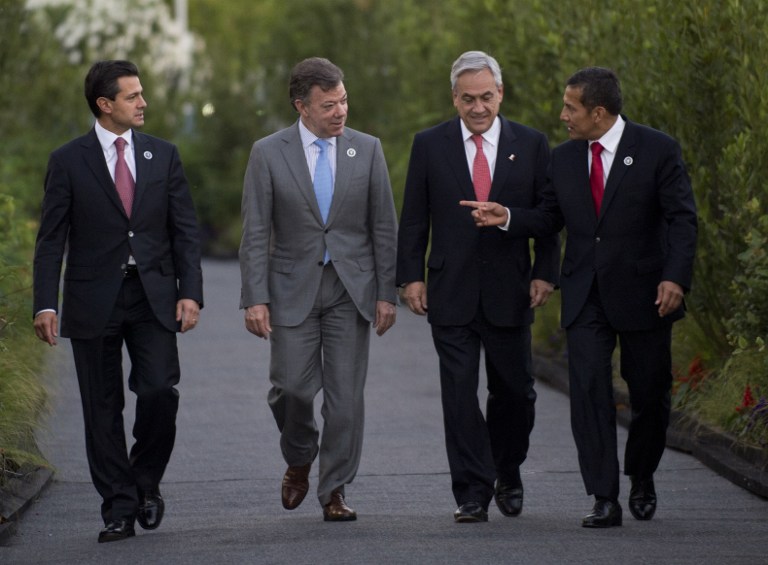SUMMARY
This is AI generated summarization, which may have errors. For context, always refer to the full article.

SANTIAGO, Chile – Spain’s bid to join the Pacific Alliance illustrates the growing clout of the trade association between Chile, Colombia, Mexico and Peru, a new rival to the South American trading bloc Mercosur.
In an interview with Santiago daily La Tercera, Spanish Prime Minister Mariano Rajoy said his country had asked for admission during the summit of the European Union and the Community of Latin American and Caribbean States.
Spain, a former colonial power with close cultural and economic ties to the region, is reeling from a severe financial crisis and high unemployment.
It sees the trade alliance as a gateway to the booming and resource-hungry Asia-Pacific region.
“I am interested in the Pacific just as much as in Latin America, because in the Pacific we can invest, people from the Pacific can invest in our country, we can export our products to countries that are growing,” Rajoy explained.
Other European leaders at the weekend’s EU-CELAC summit agreed.
“Efforts at greater integration of the Pacific Alliance will strengthen its position regionally and internationally, which make them even more attractive partners,” said European Council President Herman van Rompuy.
An initiative of former Peruvian president Alan Garcia, the alliance was formally set up in Chile last June.
“I have no doubt that this process is the most important in Latin American history, not only because of the importance of its members but because of what they have already achieved,” said Colombian President Juan Manuel Santos.
“The four are the fastest growing economies in Latin America, with common denominators,” he added.
With expected GDP growth of 6.3 percent this year, Peru is the star performer among the four, followed by Chile with 5.5 percent, Colombia with 4.8 percent and Mexico with 3.5 to 4 percent.
All four do better than the regional average of 3.1 percent, largely on the back of increased exports of commodities, mainly to China.
Chile and Peru are the world’s leading producers of copper, of which resource-hungry China is the main customer.
The Pacific Alliance’s objective is “to deepen the integration of these economies and work out joint actions for trade links with the Asia-Pacific region, based on existing bilateral trade agreements between member states.”
The group also aims to “move gradually toward the goal of free movement of goods, services, capital and people”.
The economies of the four countries are among the most liberalized in the world. Chile has 22 trade agreements linking it to 60 countries or regions, including the European Union, the United States, China, Japan, South Korea.
Mexico meanwhile has a web of 12 trade agreements with 44 countries, including the United States, China and the EU.
The Pacific Alliance says it represents a market of 215 million consumers and has a combined GDP of more than $2 trillion.
Some experts see it as a rival to the South American trading bloc Mercosur which has yet to achieve its goal of a common market more than two decades after its creation.
Founded in 1991 by Argentina, Brazil, Paraguay and Uruguay, Mercosur now also includes Venezuela.
The Europeans have pushed for the speedy conclusion of a free trade pact with Mercosur.
But negotiations have so far stumbled over differences on agriculture — notably Europe’s subsidies to its farmers, which undermine Latin America’s efforts to sell its own products. – Rappler.com
Add a comment
How does this make you feel?
There are no comments yet. Add your comment to start the conversation.